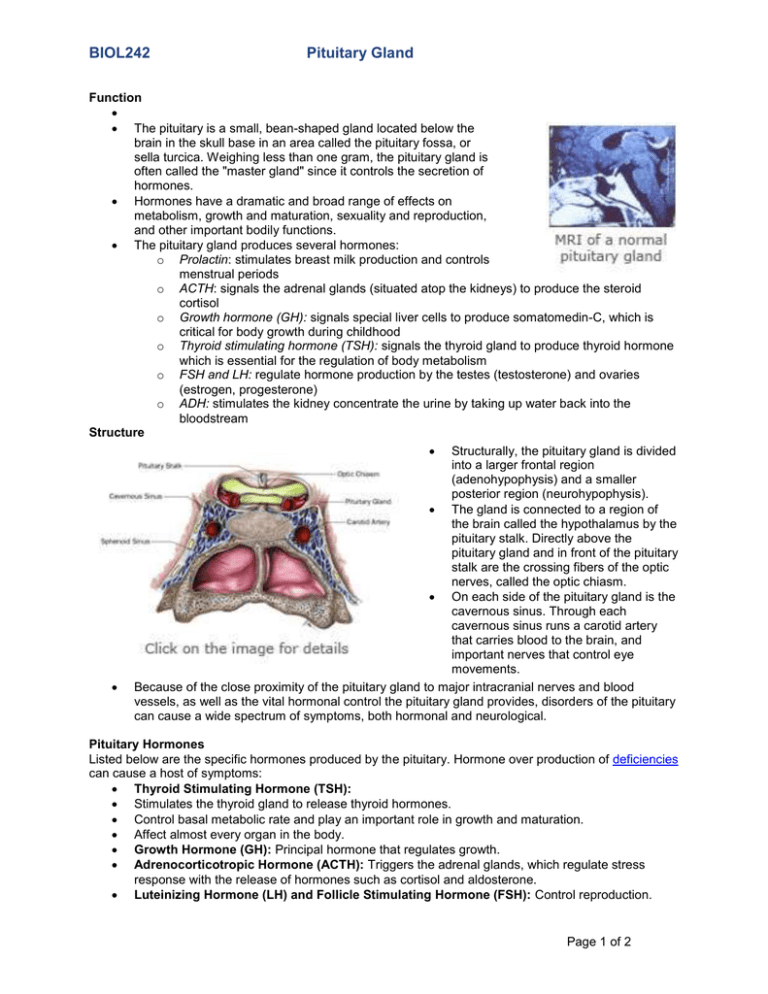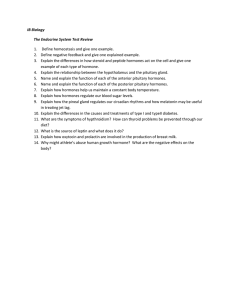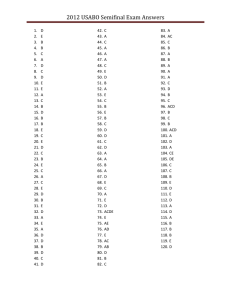BIOL242 Pituitary Gland
advertisement

BIOL242 Pituitary Gland Function The pituitary is a small, bean-shaped gland located below the brain in the skull base in an area called the pituitary fossa, or sella turcica. Weighing less than one gram, the pituitary gland is often called the "master gland" since it controls the secretion of hormones. Hormones have a dramatic and broad range of effects on metabolism, growth and maturation, sexuality and reproduction, and other important bodily functions. The pituitary gland produces several hormones: o Prolactin: stimulates breast milk production and controls menstrual periods o ACTH: signals the adrenal glands (situated atop the kidneys) to produce the steroid cortisol o Growth hormone (GH): signals special liver cells to produce somatomedin-C, which is critical for body growth during childhood o Thyroid stimulating hormone (TSH): signals the thyroid gland to produce thyroid hormone which is essential for the regulation of body metabolism o FSH and LH: regulate hormone production by the testes (testosterone) and ovaries (estrogen, progesterone) o ADH: stimulates the kidney concentrate the urine by taking up water back into the bloodstream Structure Structurally, the pituitary gland is divided into a larger frontal region (adenohypophysis) and a smaller posterior region (neurohypophysis). The gland is connected to a region of the brain called the hypothalamus by the pituitary stalk. Directly above the pituitary gland and in front of the pituitary stalk are the crossing fibers of the optic nerves, called the optic chiasm. On each side of the pituitary gland is the cavernous sinus. Through each cavernous sinus runs a carotid artery that carries blood to the brain, and important nerves that control eye movements. Because of the close proximity of the pituitary gland to major intracranial nerves and blood vessels, as well as the vital hormonal control the pituitary gland provides, disorders of the pituitary can cause a wide spectrum of symptoms, both hormonal and neurological. Pituitary Hormones Listed below are the specific hormones produced by the pituitary. Hormone over production of deficiencies can cause a host of symptoms: Thyroid Stimulating Hormone (TSH): Stimulates the thyroid gland to release thyroid hormones. Control basal metabolic rate and play an important role in growth and maturation. Affect almost every organ in the body. Growth Hormone (GH): Principal hormone that regulates growth. Adrenocorticotropic Hormone (ACTH): Triggers the adrenal glands, which regulate stress response with the release of hormones such as cortisol and aldosterone. Luteinizing Hormone (LH) and Follicle Stimulating Hormone (FSH): Control reproduction. Page 1 of 2 BIOL242 Pituitary Gland Prolactin (PRL): Stimulates secretion of breast milk. Vasopressin, also called anti-diuretic hormone (ADH): Promotes water retention. UCLA encourages the use of this site and other UCLA sites, regardless of domain address, as a way to share information and knowledge in support of the University's three-part mission of education, research and public service. © 2006 The Regents of the University of California Photographs © 2003 by Alan Nyiri, courtesy of the Atkinson Photographic Archive, Stephanie Diani, © 2006 Regents of the University of California Notes, Add’l. Info.: Page 2 of 2






